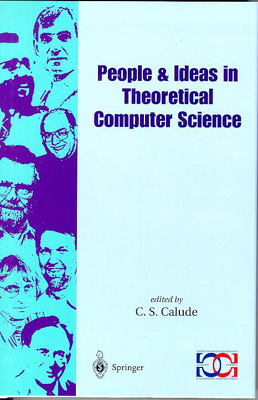

C. S. Calude (ed.). People and Ideas in Theoretical Computer Science, Springer-Verlag, Singapore, 1998, vi + 351 pp. ISBN : 981-4021-13-X. US$39.95 Hardcover + Jacket.
Theory and theoreticians have played a major role in computer science. Many insights into the nature of efficient computations were gained and theory was crucial for some of the most celebrated engineering triumphs of computer science (e.g., in compiler design, databases, multitask operating systems, to name just a few). Theoretical computer science functions as a communication bridge between computer science and other subjects, notably, mathematics, linguistics, biology; it is a champion in developing unconventional models of computation (DNA, quantum).
This book collects personal accounts and reflections of fourteen eminent scientists who have dedicated themselves to the craft of theoretical computer science. Contributions focus on authors specific interests, experiences, and reminiscences. The emerging picture, which is just one among other possible ones, should be a catalyst for further developments and continuations.
"I was most interested to learn about the project, which should be a worthwhile one. " N. Chomsky, MIT.
"The human story of creativity is inspiring and documents a very noble activity---the creation of knowledge in its most beautiful and useful form---the creation of a science. Supplying the technical and intellectual tools to probe some of the most fascinating questions about the nature of thought and intelligence, theoretical computer science is trying to grasp the limits of rational thought, the limits of knowable. This book will contribute to the understanding of the creation of a magnificent science." J. Hartmanis, NSF.
"This is obviously an extremely worthwhile project. " D. E. Knuth, Stanford University.
Contents: The Forbidden Sidetrip (Laszlo Babai); Elegant Lisp Programs (Gregory J. Chaitin); From Logic to Computer Science and back ( (Martin Davis); From My Life (Edsger W. Dijkstra); Tossing Algebraic Flowers down to the Great Divide (Joseph Goguen); Towards Computer Science (Helmut Jurgensen); The Mysteries of Algorithms (Richard M. Karp); Bridging Linguistics and Computer Science, via Mathematics (Solomon Marcus); Hilbert's Tenth Problem: A Two-way Bridge between Number Theroy and Computer Science (Yuri Matiyasevich); Not Only Theory (Hermann Maurer); The Magic of Theory and the Theory of Magic (Gregorz Rozenberg); Events and Languages (Arto Salomaa); Leninggrad/St. Petersburg (1961-1998): From Logic to Complexity and Further (Anatol Slissenko); From Logic to Theoretical Computer Science (Boris Trakhtenbrot).
Editor's biography: C. S. Calude was born and educated in Romania. He holds a Personal Chair in Computer Science and is the Director of the Centre for Discrete Mathematics and Theoretical Computer Science at the University of Auckland. Professor Calude has (jointly) published, more than 150 papers. He (jointly) authored or edited 25 books and proceedings; among them, Theories of Computational Complexity (North-Holland, 1988), Information and Randomness (Springer, 1994), Unconventional Models of Computation (Springer, 1998; co-edited with J. Casti and M. J. Dinneen). His current research interests include algorithmic information theory, recursion theory, computational complexity, automata theory, and quantum logic and computation.